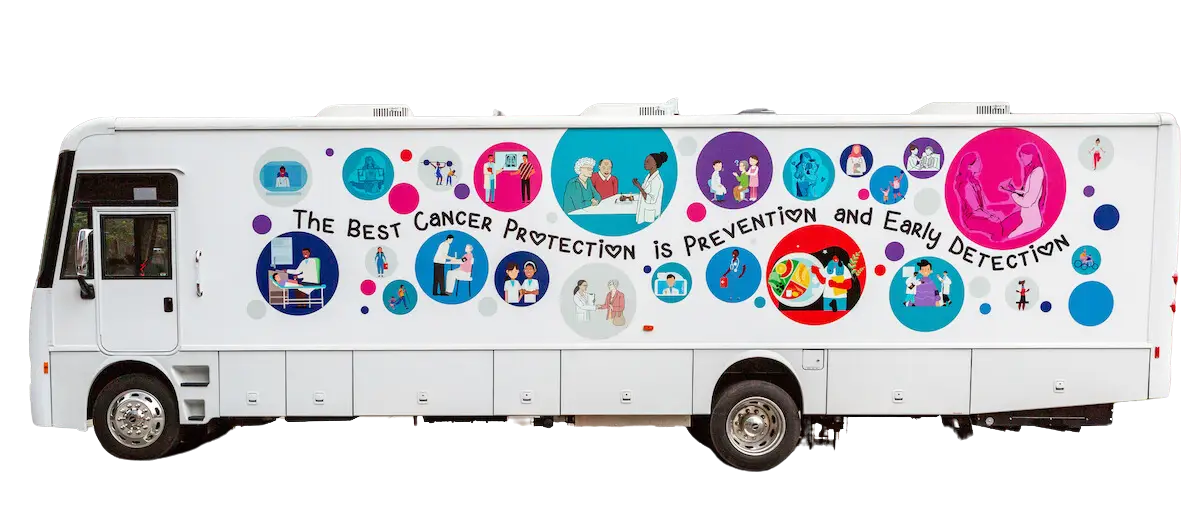Education: Prostate Cancer
Prostate cancer is the most common cancer and the second leading cause of cancer death among men in the United States
The discussion with your physician about screening should take place at:
- Age 50 for men who are at average risk of prostate cancer and are expected to live at least 10 more years.
- Age 45 for men at high risk of developing prostate cancer. This includes African Americans and men who have a first-degree relative (father or brother) diagnosed with prostate cancer at an early age (younger than age 65).
- Age 40 for men at even higher risk (those with more than one first-degree relative who had prostate cancer at an early age).

After this discussion, men who want to be screened should get the prostate-specific antigen (PSA) blood test.
The digital rectal exam (DRE) may also be done as a part of screening.
If no prostate cancer is found as a result of screening, the time between future screenings depends on the results of the PSA blood test:
- Men who choose to be tested who have a PSA of less than 2.5 ng/mL may only need to be retested every 2 years.
- Screening should be done yearly for men whose PSA level is 2.5 ng/mL or higher.
- Men who choose to be tested who have a PSA of less than 2.5 ng/mL may only need to be retested every 2 years.
- Screening should be done yearly for men whose PSA level is 2.5 ng/mL or higher.
Prostate Cancer Resources
Learn more with information about screening types courtesy of Rutgers Cancer Institute Prostate Cancer Resource & Learning Center and The National Cancer Institute's Prostate Cancer Overview.
Types of Screenings
There is no standard or routine screening test for prostate cancer.
Digital rectal exam
Digital rectal exam (DRE) is an exam of the rectum. The doctor or nurse inserts a lubricated, gloved finger into the lower part of the rectum to feel the prostate for lumps or anything else that seems unusual.
Prostate-specific antigen test
A prostate-specific antigen (PSA) test is a test that measures the level of PSA in the blood. PSA is a substance made mostly by the prostate that may be found in an increased amount in the blood of men who have prostate cancer. The level of PSA may also be high in men who have an infection or inflammation of the prostate or benign prostatic hyperplasia (BPH; an enlarged, but noncancerous, prostate).
A prostate cancer gene 3 (PCA3) RNA test may be used for certain patients.
If a man had a high PSA level and a biopsy of the prostate did not show cancer and the PSA level remains high after the biopsy, a prostate cancer gene 3 (PCA3) RNA test may be done. This test measures the amount of PCA3 RNA in the urine after a DRE. If the PCA3 RNA level is higher than normal, another biopsy may help diagnose prostate cancer.
Information about screening types courtesy of the National Cancer Institute’s PDQ cancer information summary for Prostate Cancer.
Information about risk-based screening from the American Cancer Society.

DID YOU KNOW?
ScreenNJ Screening Statistics
the Garden State
findings detected
Why Should You Get Screened?
One in two men and one in three women will develop cancer in their lifetime
Early diagnosis of cancer offers the best chance for successful treatment. When cancer care is delayed or inaccessible there is a lower chance of survival, greater problems associated with treatment, and higher costs of care.
Visit our Education page to learn more about various cancer types and screening options.
Types of Screenings Available:
- Breast Cancer
- Cervical Cancer
- HPV-Related Cancers
- Colorectal Cancer
- Genetically-Linked Cancers
- Lung Cancer
- Prostate Cancer
- Skin Cancer
Get the Assistance you need
Learn More About Patient Navigation
Patient navigators are trained, culturally competent healthcare professionals who work with patients, families, physicians and other healthcare providers to ensure cancer patients’ needs are appropriately and effectively addressed.
Get connected to a navigator to gain assistance with qualification, scheduling, transportation, and more.
Discover our mobile health unit
Free Cancer Screenings and Care Coordination for the uninsured and under-served across New Jersey
Now Offering:
- Patient navigation for care coordination
- Education and outreach
- Supportive services to address social determinants of health
- History and physical examinations
- Laboratory testing
- Referrals and authorizations


Who Qualifies for Screening?
The New Jersey Cancer Education and Early Detection Screening Program (NJCEED) is part of the New Jersey Department of Health.
NJCEED provides comprehensive screening services for breast, cervical, prostate, and colorectal cancer. The services include education, outreach, early detection, case management, screening, tracking, and follow-up. Breast, cervical, prostate, and colorectal cancers can be treated more effectively when found early.
Persons eligible for these services must be at or below 250% of the Federal Poverty Level and be uninsured or under-insured. For more information, please call 1-800-328-3838 or locate a screening location here.
Screening for cancer is covered with no deductible or co-pay by many insurance plans including Medicare, and patients with no insurance may be able to receive recommended cancer screenings at their NJ CEED agency or at other ScreenNJ partner sites. Visit our Frequently Asked Questions page to learn more.
